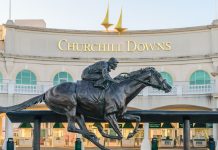G2E’s inaugural Sports Betting Symposium yielded some robust debate during the second day of proceedings during a panel comprising moderator Scott Van Pelt, anchor of ESPN’s SportsCenter; alongside Kenny Gersh of Major League Baseball; Stephen Master of Nielsen Sports; and the AGA’s Sara Slane.
A major talking point was data rights, with Gersh saying: The data one is the one that surprises me the most as far as push back is concerned where we have that discussion. For me it really is about that move to in-play betting – that’s what we’re talking about when we’re talking about data. It’s all the bettable events that happen during the game that I think are going to help grow the revenue for all of us and the engagement for all of us.”
Justifying the rationale behind charging for the mandatory use of official data, he added: “We’ve spent millions of dollars in the past couple of years, even before sports betting was on our radar, installing cameras and radars and other things to track everything that’s happening on the field of play. The idea was to be able to tell news stories about what’s happening on the baseball field.
“As you’re making the in-game bets you want that one true source of fast, reliable, consistent data amongst all operators. But we’re only going to provide that to the legal, licensed operators. There’s all this discussion about the offshore books and if we can give an advantage to the legal, regulated market we will give that data to them.”
Slane responded by questioning the need for data provision to be included on the statute books. “I don’t think anyone is saying they wouldn’t pay for the data,” she challenged. “I just don’t think it should be done in statute. So there shouldn’t be a legal requirement that we have to buy the data that ultimately gives you the monopoly you alluded to. Let it be done through contracts. That’s the way it’s been done in Nevada for the past 50 years – so we think that’s a reasonable alternative to putting it in law.
“You see these contracts moving forward right now. The NBA has just done a deal with MGM, Las Vegas Golden Knights has done a deal with William Hill. I don’t know of another industry that has it in statute that there’s a legal requirement between two entities to have some form of obligation to move it forward. We can do it through contracts.”
Turning to the controversial topic of the so-called integrity fee, Gersh told delegates: “There’s a lot of misinformation. This is not an integrity fee – we don’t call it an integrity fee. I’ll call it essentially what it is, which is a royalty. And also, one per cent is not something we’ve been asking for. It’s what we were asking for in the beginning but we realised very quickly that was not the correct amount. So we’ve been talking about a quarter point, a .25 per cent of the handle. So with that out of the way it’s not an integrity fee and it’s not at one per cent.”
He continued: “Why do I think a royalty makes sense? I have two main themes. One is a case of fairness and two is a case of partnership. On the fairness standpoint, I’m glad that the states now have an opportunity to make decisions as to whether they want to have sports betting legalized in their state or not. There are reasons for and reasons against. The next step is about who are we going to allow to make money from this because right now it’s illegal. The state is going to designate these three, four, five very specific licensed entities. You guys get the right to make money from sports betting. And you’re going to make money from sports betting. Yes, there’s risk involved, but I haven’t really heard of a lot of bookies going out of business because they can’t do it properly.
“From a fairness perspective, if the Yankees aren’t playing the Red Sox last night you aren’t having a bet – if baseball doesn’t exist you’re not betting on it. So to grant someone the opportunity to make money off of our sport – we think we should be involved in that so a quarter point off the top of what’s being bet is a fair number.
“On the second point, it’s got to be a partnership. For sports betting to work it really should be a partnership between the leagues, the states and the sportsbooks and the casinos to help make it successful. And frankly we haven’t done that in Nevada. Nevada has had sports betting for years, the leagues have had their attitude to sports betting for years. Now sports betting is happening and we’re willing to be a part of it.
“If we’re incentivized to do so by having this royalty attached to it, we’re going to wade in. We’re going to do things with our data, we’re going to potentially allow our clubs to take advertising and shine our light onto a regulated sports betting market. We’re going to increase handle by our participation. If we embrace it and all go into – the states, the casinos and the leagues together – we’ll increase the handle. So by asking for a quarter point off the handle, we need to increase the handle by seven per cent to make that pay for itself.
Gersh’s statement was met coolly by Slane who responded: “You want a cut of the revenue without any of the risk. This is why we have to go through a regulatory process. We have to invest billions of dollars in buildings and our licenses that cost us hundreds of millions of dollars to go through. You want us to take that risk, pay you and then you’re going to benefit on the back end as well.
“In a way, the legal, regulated industry is being viewed as the enemy, where really the enemy is the illegal market. In order for us to compete with the illegal market it has to be financially viable. What you guys are proposing is not financially viable. So at the end of the day you’re not going to be moving consumers from the illegal market to the legal, regulated market. We can’t offer the odds. This is the sticking point right now. We have private contracts going on right now and that’s how we will continue and I think everyone agrees that makes most sense.”














